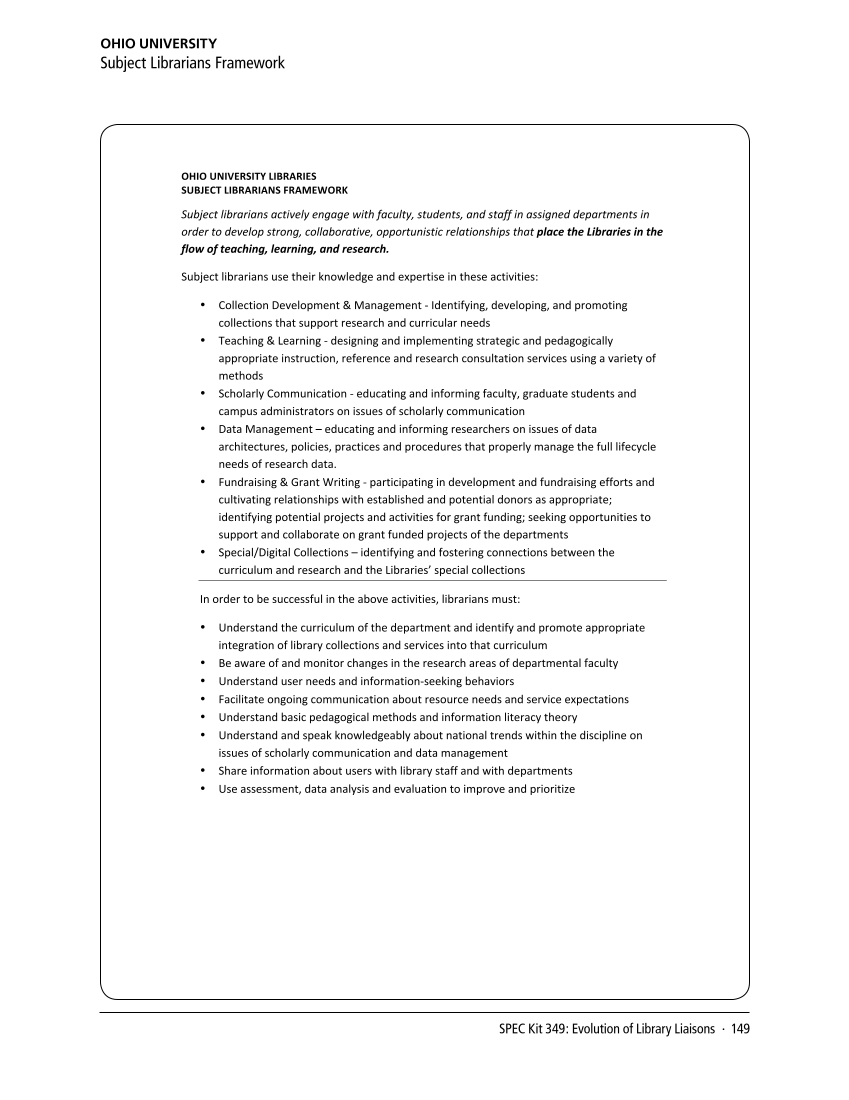SPEC Kit 349: Evolution of Library Liaisons · 149
OHIO UNIVERSITY
Subject Librarians Framework
OHIO UNIVERSITY LIBRARIES
SUBJECT LIBRARIANS FRAMEWORK
Subject librarians actively engage with faculty, students, and staff in assigned departments in
order to develop strong, collaborative, opportunistic relationships that place the Libraries in the
flow of teaching, learning, and research.
Subject librarians use their knowledge and expertise in these activities:
• Collection Development &Management -‐ Identifying, developing, and promoting
collections that support research and curricular needs
• Teaching &Learning -‐ designing and implementing strategic and pedagogically
appropriate instruction, reference and research consultation services using a variety of
methods
• Scholarly Communication -‐ educating and informing faculty, graduate students and
campus administrators on issues of scholarly communication
• Data Management – educating and informing researchers on issues of data
architectures, policies, practices and procedures that properly manage the full lifecycle
needs of research data.
• Fundraising &Grant Writing -‐ participating in development and fundraising efforts and
cultivating relationships with established and potential donors as appropriate
identifying potential projects and activities for grant funding seeking opportunities to
support and collaborate on grant funded projects of the departments
• Special/Digital Collections – identifying and fostering connections between the
curriculum and research and the Libraries’ special collections
In order to be successful in the above activities, librarians must:
• Understand the curriculum of the department and identify and promote appropriate
integration of library collections and services into that curriculum
• Be aware of and monitor changes in the research areas of departmental faculty
• Understand user needs and information-‐seeking behaviors
• Facilitate ongoing communication about resource needs and service expectations
• Understand basic pedagogical methods and information literacy theory
• Understand and speak knowledgeably about national trends within the discipline on
issues of scholarly communication and data management
• Share information about users with library staff and with departments
• Use assessment, data analysis and evaluation to improve and prioritize
OHIO UNIVERSITY
Subject Librarians Framework
OHIO UNIVERSITY LIBRARIES
SUBJECT LIBRARIANS FRAMEWORK
Subject librarians actively engage with faculty, students, and staff in assigned departments in
order to develop strong, collaborative, opportunistic relationships that place the Libraries in the
flow of teaching, learning, and research.
Subject librarians use their knowledge and expertise in these activities:
• Collection Development &Management -‐ Identifying, developing, and promoting
collections that support research and curricular needs
• Teaching &Learning -‐ designing and implementing strategic and pedagogically
appropriate instruction, reference and research consultation services using a variety of
methods
• Scholarly Communication -‐ educating and informing faculty, graduate students and
campus administrators on issues of scholarly communication
• Data Management – educating and informing researchers on issues of data
architectures, policies, practices and procedures that properly manage the full lifecycle
needs of research data.
• Fundraising &Grant Writing -‐ participating in development and fundraising efforts and
cultivating relationships with established and potential donors as appropriate
identifying potential projects and activities for grant funding seeking opportunities to
support and collaborate on grant funded projects of the departments
• Special/Digital Collections – identifying and fostering connections between the
curriculum and research and the Libraries’ special collections
In order to be successful in the above activities, librarians must:
• Understand the curriculum of the department and identify and promote appropriate
integration of library collections and services into that curriculum
• Be aware of and monitor changes in the research areas of departmental faculty
• Understand user needs and information-‐seeking behaviors
• Facilitate ongoing communication about resource needs and service expectations
• Understand basic pedagogical methods and information literacy theory
• Understand and speak knowledgeably about national trends within the discipline on
issues of scholarly communication and data management
• Share information about users with library staff and with departments
• Use assessment, data analysis and evaluation to improve and prioritize












































































































































































































